Time to get your "Freak" on.
Two dozen bands and DJs were originally scheduled to perform tomorrow on stages in Shida park (師大公園) and inside the nearby Underworld (地下社會) music pub for this year's Freak Out Beast (吵年獸) festival. Because of inclement weather, organizers have provisionally postponed sections of the event until next weekend.
Part street fair, part concert, the third annual Freak Out Beast Chinese New Year Music and Art Festival Project (2008吵年獸立春音樂藝術季) started last week with art exhibitions that are on display inside the Shida neighborhood's Mi Tsang (米倉音像食館), Salt Peanuts, and Zabu (雜舖居酒食堂) cafes through next week.
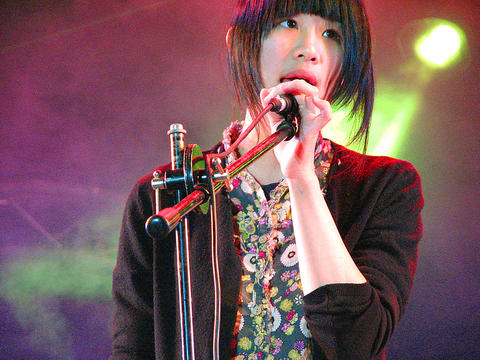
PHOTO COURTESY OF FREAK OUT BEAST
Besides the concerts, Shida park will also host the festival's outdoor creative market (創意市集). The market will spill out onto the sidewalk along Shida Road (師大路) and showcase independent designers selling handmade T-shirts, jewelry and other clothing and fashion accessories.
Musicians and artists affiliated with indie-electronica collective KbN (凱比鳥) are organizing the festival under the name Shibishou (詩筆獸), with support from the Taipei City government's Cultural Affairs Bureau (台北市政府文化局). The concerts were scheduled to run from 2pm to 10pm. The creative markets were scheduled from 2pm to 10pm. Admission will be NT$100 for the shows at Underworld. All other events are free. Check the event's Web site for updated dates and times.
Freak Out Beast is presented as a modern take on traditional Lunar New Year celebrations, one that aims to inject energy into a city that quiets down as residents head south to visit family during the holidays. The festival takes its name from the ancient practice of dancing and using gongs, drums and firecrackers to scare away Nian Shou (年獸), the legendary monster that sneaks in from the mountains every winter to feed on humans. According to myth, Nian Shou fears explosions and has an aversion to red, the color associated with the Lunar New Year.
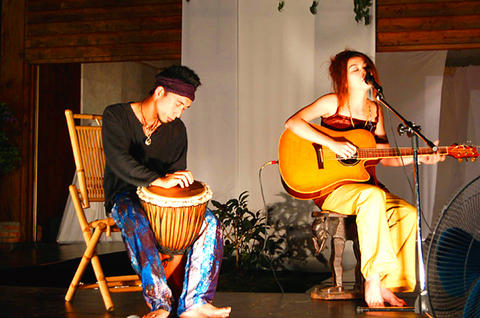
PHOTO COURTESY OF FREAK OUT BEAST
Since 2006, Taipei has seen at least one street fair similar to Freak Out Beast every month. Freak Out, as much a music festival as it is an art fair, and the monthly city-hopping Campo Life Art Carnival (CAMPO生活藝術狂歡節), usually held in Sindian, Taipei County, were first staged that year. Organizers present these and similar festivals as alternatives to consumerism and attempts to introduce art into the daily lives of city residents.
Founded in 2003, the Guling Street Book and Art Fair (牯嶺街書香創意市集) is generally recognized as having launched this trend. It was one of the first street fairs in Taiwan to emphasize interaction between artists and fairgoers and offer what are commonly called "creative markets," forums for the sale of handmade and secondhand products.
Recent admission-charging commercial music festivals, including Neutron Innovation's (中子創新) Urban Simple Life (簡單生活節) and TK Rock concert (台客搖滾嘉年華), have incorporated creative markets and other elements of these street fairs.
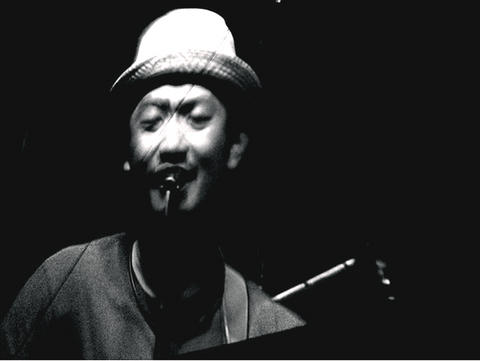
PHOTO COURTESY OF FREAK OUT BEAST
The first Freak Out Beast featured performances by 20 bands and DJs. The event drew around 1,000 people to Huashan Culture Park (華山文化園), according to Shibishou. The second, a free unplugged acoustic music festival, art exhibition and street fair, was held in Yongkang Park (永康公園) and attracted crowds of 20,000 people each of the two weekends it ran, said Meline Yu (余柔靜), a media contact for this year's fest. (This figure could not be independently confirmed.) The musical leg of the second weekend, however, was cancelled after people living near the park complained about the noise.
Notable musical acts include Black Reign, the Taipei-based Jamaican sound system formerly known as the O-Brothaz, festive indie-rock band 88 Balaz (88顆芭樂籽), Hakka rapper Kou Chou-ching (拷秋勤), indie-electronica acts Space Cake (太空蛋糕) and Digihai and DJ Zephec, who spins industrial-flavored micro house.
For updated information on performances, venues and markets, see the blog: freakoutbeast.blogspot.com
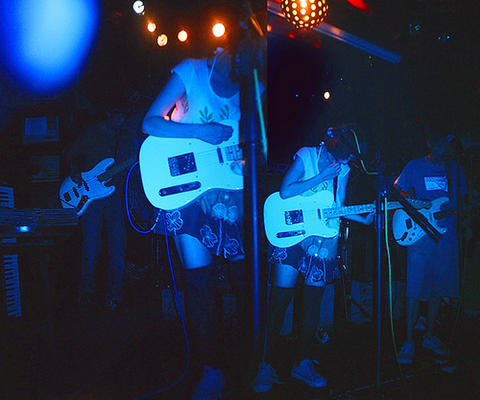
PHOTO COURTESY OF FREAK OUT BEAST
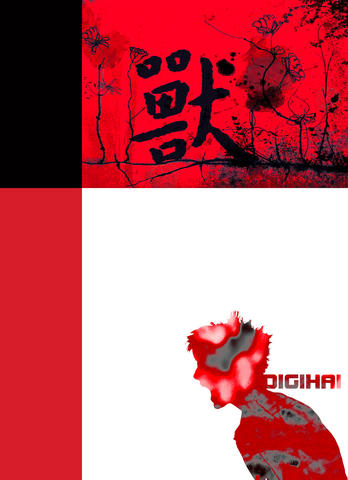
ILLUSTRATION: TAIPEI TIMES

The Democratic Progressive Party (DPP), Chinese Nationalist Party (KMT), and the country’s other political groups dare not offend religious groups, says Chen Lih-ming (陳立民), founder of the Taiwan Anti-Religion Alliance (台灣反宗教者聯盟). “It’s the same in other democracies, of course, but because political struggles in Taiwan are extraordinarily fierce, you’ll see candidates visiting several temples each day ahead of elections. That adds impetus to religion here,” says the retired college lecturer. In Japan’s most recent election, the Liberal Democratic Party lost many votes because of its ties to the Unification Church (“the Moonies”). Chen contrasts the progress made by anti-religion movements in

Taiwan doesn’t have a lot of railways, but its network has plenty of history. The government-owned entity that last year became the Taiwan Railway Corp (TRC) has been operating trains since 1891. During the 1895-1945 period of Japanese rule, the colonial government made huge investments in rail infrastructure. The northern port city of Keelung was connected to Kaohsiung in the south. New lines appeared in Pingtung, Yilan and the Hualien-Taitung region. Railway enthusiasts exploring Taiwan will find plenty to amuse themselves. Taipei will soon gain its second rail-themed museum. Elsewhere there’s a number of endearing branch lines and rolling-stock collections, some

This was not supposed to be an election year. The local media is billing it as the “2025 great recall era” (2025大罷免時代) or the “2025 great recall wave” (2025大罷免潮), with many now just shortening it to “great recall.” As of this writing the number of campaigns that have submitted the requisite one percent of eligible voters signatures in legislative districts is 51 — 35 targeting Chinese Nationalist Party (KMT) caucus lawmakers and 16 targeting Democratic Progressive Party (DPP) lawmakers. The pan-green side has more as they started earlier. Many recall campaigns are billing themselves as “Winter Bluebirds” after the “Bluebird Action”

Last week the State Department made several small changes to its Web information on Taiwan. First, it removed a statement saying that the US “does not support Taiwan independence.” The current statement now reads: “We oppose any unilateral changes to the status quo from either side. We expect cross-strait differences to be resolved by peaceful means, free from coercion, in a manner acceptable to the people on both sides of the Strait.” In 2022 the administration of Joe Biden also removed that verbiage, but after a month of pressure from the People’s Republic of China (PRC), reinstated it. The American